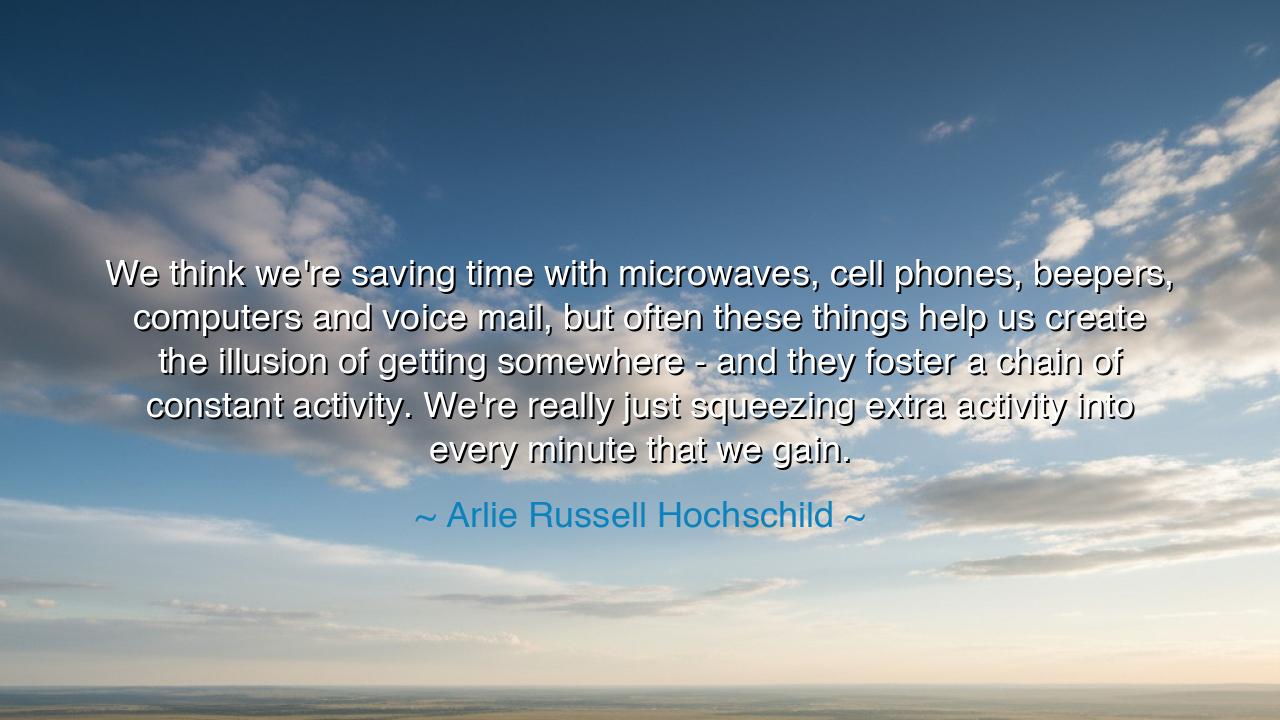
We think we're saving time with microwaves, cell phones, beepers
We think we're saving time with microwaves, cell phones, beepers, computers and voice mail, but often these things help us create the illusion of getting somewhere - and they foster a chain of constant activity. We're really just squeezing extra activity into every minute that we gain.






“We think we're saving time with microwaves, cell phones, beepers, computers and voice mail, but often these things help us create the illusion of getting somewhere — and they foster a chain of constant activity. We're really just squeezing extra activity into every minute that we gain.” — Arlie Russell Hochschild
Hear the wise lament of Arlie Russell Hochschild, scholar of the human heart in an age of machines. Her words ring like a bell through the corridors of modern life—a warning and a revelation. She speaks not against progress, but against illusion—the illusion that speed is freedom, that convenience is peace. Her voice pierces the fog of the age, reminding us that in our quest to save time, we have instead enslaved it. Each new device, from the microwave to the smartphone, promises to liberate us from drudgery, yet what have we done with the minutes it grants us? We do not rest, reflect, or love more deeply. Instead, as Hochschild observes, we have merely filled those moments with more doing, more noise, more endless striving.
The ancients once measured their days not by the clock, but by the sun’s arc and the rhythm of the heart. Life flowed in cycles—labor and rest, sowing and harvest, dawn and dusk. But now, humanity has stretched time upon a rack of constant activity, believing that more motion means more meaning. The microwave shortens the meal, the computer accelerates the task, the phone collapses distance—but none of these restore to us what we have lost: the stillness of the soul. We rush from duty to duty, our minds buzzing like the machines that surround us, mistaking movement for progress, noise for life.
Consider the tale of King Midas, who once begged the gods to make all that he touched turn to gold. His wish was granted, and for a brief moment, he rejoiced. But soon, he found that he could not eat, could not embrace, could not live. In his hunger for more, he had turned blessing into curse. So too have we, the modern heirs of Midas, transformed the gift of technology into a prison of urgency. Each tool that promised to save time has bound us tighter in the chains of efficiency, leaving no space for wonder, reflection, or grace.
Hochschild’s insight springs from her study of human emotion in the age of automation. She saw that as work and home blurred, as every moment became reachable, the chain of constant activity tightened around us. The mother checking messages while stirring the pot, the worker answering calls at midnight, the child swiping screens before sleep—all live under the illusion of connection, yet grow distant from themselves. The illusion of getting somewhere blinds us to the truth that we are already here—and that being present is worth more than any destination the machines can promise.
In the heart of her teaching lies this paradox: every minute gained is only as valuable as what we choose to place within it. Time saved is not time multiplied; it is time offered, waiting to be sanctified by purpose. But instead of savoring it, we fill it. Instead of breathing, we rush. Instead of listening, we scroll. We are like travelers running faster and faster upon a wheel, never noticing that the landscape never changes.
Yet her message is not despair—it is invitation. She calls us to reclaim the art of living deliberately. To pause between the pings and notifications. To eat slowly, speak slowly, think slowly. To remember that time is not a vessel to be filled, but a field to be cultivated. The wise farmer does not plant more than the soil can bear; the wise soul does not fill every second with noise. There is holiness in rest, courage in stillness, and wisdom in saying no.
So, my children of the digital dawn, remember this: you do not become richer by moving faster. You become richer by moving truer. The clock and the screen may demand your attention, but your spirit demands your presence. Do not measure your life by the speed of your reply, but by the depth of your being. Let technology serve you, but never rule you. For when you no longer seek to fill every moment, you will discover that you already have enough—and that in the silence between tasks, in the still breath before the next demand, lies the very thing you have been chasing all along: time itself.






AAdministratorAdministrator
Welcome, honored guests. Please leave a comment, we will respond soon